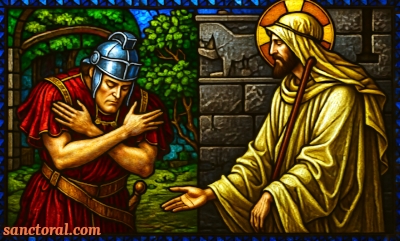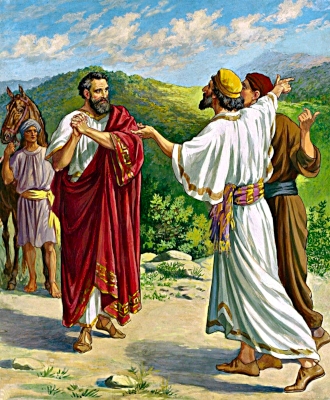The lessons in the divine Office during the month of October, are taken from the books of Machabees. Then God raised up heroes. A priest named Mathathias rallied all who were still filled with zeal for the Law and the worship of the Covenant and named his son Judas Machabeus as leader of the force which he had raised to champion the rights of the true God; and with his tiny army Judas gladly fought the battles of Israel. In war he was “like a lion and like a lion’s welp roaring for his prey.” He wiped out “the wicked,” and routed Antiochus’ great army and re-established the true worship at Jerusalem. Filled with the Spirit of God, the Machabees had reconquered their country and saved the soul of their people. “The sacrilegious superstitions of the Gentile world,” says St Augustine, "had filled the temple with defilement; but it was cleansed from all these profanations of idolatry (Secund Sunday in October, Second Nocturn). Again, St Ambrose comments: “Some men have been captivated by the glory of arms, and rate courage in warfare above all else. Josue, Gedeon and Jonathas are heroes but what shall we say of the Machabees ? With three thousand Jews they conquered forty-eight thousand Syrians! We can form some idea of their mettle from the action of one of their soldiers. This man, Eleazar, having noticed an elephant taller than the rest and covered with the royal body-cloth, concluding that it was being ridden by the king himself, ran with all his might into the midst of the hostile legion and throwing away his shield, slew right and left with both hands until he reached the elephant, underneath which he crept and pierced it with his sword. The animal fell and Eleazar perished under its weight. Smothered rather than crushed, he was buried in triumph” (First Sunday of October, Second Nocturn). All the chants of the Mass express sentiments entirely similar to those of the Machabees. In the Gradual we say: “The eyes of all hope in Thee, O Lord.” And the psalm adds: “He will do the will of them that fear Him... He will hear their prayer and save them... but all the wicked will He destroy.” "O God,” declares the Alleluia, “I will sing and give praise to Thee my glory,” and the psalm ends with the words: “Through God we shall do mightily: and He will bring our enemies to nothing.” The Offertory is a hymn of thanksgiving after the deliverance from the captivity of Babylon and the rebuilding of Jerusalem and the Temple, the same Temple that was restored under the Machabees. The Communion psalm, which also supplies the verse at the Introit, shows how Qod blesses those who serve Him and comes to their assistance in all their troubles. Finally, the Introit, after acknowledging that the chastisements which have weighed heavily on the Chosen People are due to their own unfaithfulness, prays God to glorify His name by dealing with His own people “according to the multitude of His mercy.” Let us make these thoughts our own, acknowledging that our misfortunes have been brought about by our unfaithfulness in following the divine will (Introit). Let us pray God to cease chastising us, to pardon and heal us, that His Church may serve Him in peace (Collect). St. Paul shows in what a Christian life consists and calls on the faithful the more emphatically to live it because they were experiencing “evil days” it is true, indeed, that a Christian, instead of allowing himself to be affected by the contagion of evil, should have so lofty a conception of the greatness of the life to which God has called him that directly this life is threatened he should be able, like the Machabees, to appreciate it at its true worth and to make every effort to defend it and thank God for enabling him to preserve it (Epistle). The faith of the ruler, mentioned in the Gospel, was kindled by the cure of his son. We should ask God so to nourish our own that it becomes unshakeable and triumphant after the example of the faith of the Machabees. (Saint Andrew Daily Missal with Vespers for Sundays and Feasts, by Dom Gaspar Lefebvre, O.S.B. of the Abbey of St. André, 1953) (Dan. 3:31, 29, 35) All that Thou hast done to us, O Lord, Thou hast done in true judgment; because we have sinned against Thee, and we have not obeyed Thy commandments: but give glory to Thy name, and deal with us according to the multitude of Thy mercy. Ps. Blessed are the undefiled in the way; who walk in the law of the Lord, Gloria Patri. Bestow upon Thy faithful people pardon and peace, we beseech Thee, merciful Lord, that they may be both cleansed from all their sins and serve Thee with a quiet mind. Through our Lord... “Arise from the dead and Christ shall enlighten thee,” says St. Paul. Saved from death through Christ let us no more have fellowship with the works of darkness (v. 11), but live as children of the light. We should make good use of the time that is given us to do the will of God, and thank Him for the supernatural life which he has vouchsafed to call upon us to share. Lesson of the Epistle of Saint Paul the Apostle to the Ephesians (5:15-21) (Ps. 144:15-16) The eyes of all hope in Thee, O Lord; and Thou givest them meat in due season. ℣. Thou openest Thy hand, and fillest every living creature with Thy blessing. Blessed is the nation whose God is the Lord: the people whom He hath chosen for His inheritance. ℣. By the word of the Lord the heavens were established; and all the power of them by the spirit of his mouth. Alleluia, Alleluia. ℣. My heart is ready, O God, my heart is ready: I will sing, and will give praise to Thee, my glory. Alleluia. Our Lord saved the son of the ruler from death, that He might give to him and to his whole family, the life of faith. This miracle ought to help to increase our faith in Christ, by which God has freed us from the sickness of sin and from eternal death which is its result. Sequel of the holy Gospel according to John (4:46-53) (Saint Andrew Daily Missal with Vespers for Sundays and Feasts, by Dom Gaspar Lefebvre, O.S.B. of the Abbey of St. André, 1953)Twentieth Sunday after Pentecost - Jesus Heals the Official's Son

Table of Contents
Reflexions on the Liturgy of the Day
After the Babylonian captivity God’s people returned to Jerusalem where they rebuilt the Temple. But soon they were once more punished because of renewed unfaithfulness. On this occasion Antiochus Epiphanes took Jerusalem and pillaged the Temple; afterwards publishing an edict everywhere forbidding the practice of the Jewish faith. Idolatrous altars were raised in every place, and the number of apostates became so great that it seemed as if the faith of Abraham, Israel and Moses must disappear.Liturgy of the Mass
Introit
Collect
Epistle
Brethren: See how you walk circumspectly, not as unwise, but as wise; redeeming the time, because the days are evil. Wherefore, become not unwise, but understanding what is the will of God. And be not drunk with wine, wherein is luxury: but be ye filled with the Holy Spirit speaking to yourselves in psalms and hymns, and spiritual canticles, singing and making melody in your hearts to the Lord: giving thanks always for all things, in the name of our Lord Jesus Christ, to God and the Father; being subject one to another in the fear of Christ.Gradual

Gospel
At that time, there was a certain ruler whose son was sick at Capharnaum. He having heard that Jesus was come from Judaea into Galilee, went to Him, and prayed Him to come down, and heal his son; for he was at the point of death. Jesus therefore said to him: Unless you see signs and wonders, you believe not. The ruler saith to Him: Lord, come down before my son die. Jesus saith to him: Go thy way, thy son liveth. The man believed the word which Jesus said to him, and went his way. And as he was going down, his servants met him, and they brought word, saying, that his son lived. He asked therefore of them the hour wherein he grew better. And they said to him: Yesterday at the seventh hour the fever left him. The father therefore knew that it was at the same hour that Jesus said to him: Thy son liveth; and himself believed, and his whole house. Credo